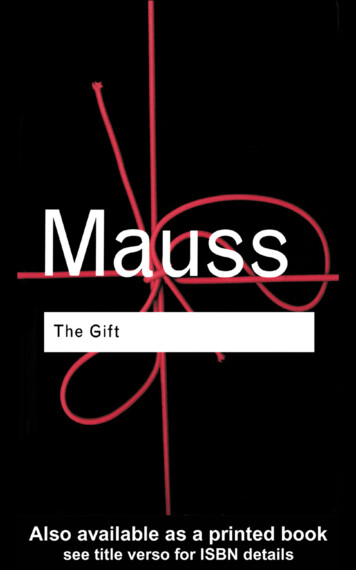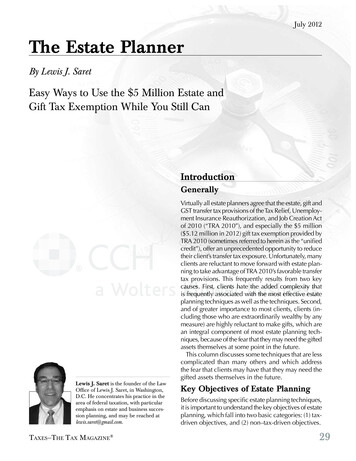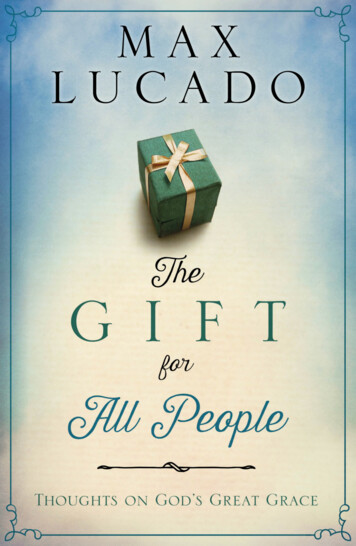
Transcription
The Gift‘The teaching of Marcel Mauss was one to which few can becompared. No acknowledgment of him can be proportionateto our debt.’Claude Lévi-Strauss‘Marcel Mauss’s famous Essay on the Gift becomes his owngift to the ages. Apparently completely lucid, with no secretseven for the novice, it remains a source of an unendingponderation ’Marshall Sahlins, Stone Age Economics‘One could go so far as to say that a work as monumental asMarcel Mauss’s The Gift speaks of everything but the gift: Itdeals with economy, exchange, contract (do et des), it speaksof raising the stakes, sacrifice, gift and countergift—in short,everything that in the thing itself impels the gift and theannulment of the gift.’Jacques Derrida, Given Time
MarcelMaussThe GiftThe form and reason for exchangein archaic societiesWith a foreword by Mary DouglasLondon and New York
Essai sur le don first published 1950 by PressesUniversitaires de France in Sociologie etAnthropologieEnglish edition first published 1954by Cohen & WestThis translation first published 1990 by RoutledgeFirst published in Routledge Classics 2002by Routledge11 New Fetter Lane, London EC4P 4EERoutledge is an imprint of the Taylor & Francis GroupThis edition published in the Taylor & Francis e-Library, 2002.Translation 1990 W.D.HallsForeword 1990 Mary DouglasAll rights reserved. No part of this book may be reprintedor reproduced or utilised in any form or by any electronic,mechanical, or other means, now known or hereafterinvented, including photocopying and recording, or inany information storage or retrieval system, withoutpermission in writing from the publishers.British Library Cataloguing in Publication DataA catalogue record for this book is available from the British LibraryISBN 0-203-40744-X Master e-book ISBNISBN 0-203-71568-3 (Adobe eReader Format)ISBN 0–415–26748–X (hbk)ISBN 0–415–26749–8 (pbk)
CONTENTSEDITORIAL NOTEFOREWORD BY MARY DOUGLAS1234IntroductionThe Exchange of Gifts and the Obligation toReciprocate (Polynesia)The Extension of this SystemLiberality, Honour, MoneySurvivals of these Principles in AncientSystems of Law and Ancient EconomiesConclusionNOTESNAME INDEXSUBJECT INDEXviiix110246083108192196
EDITORIAL NOTEThe North American Indian term ‘potlatch’ has beenretained in the translation. Various definitions of it are givenin the text: ‘system for the exchange of gifts’, (as a verb)‘to feed, to consume’, ‘place of being satiated’ [Boas]. Aselaborated by Mauss, it consists of a festival where goodsand services of all kinds are exchanged. Gifts are made andreciprocated with interest. There is a dominant idea ofr ivalry and competition between the tribe or tribesassembled for the festival, coupled occasionally withconspicuous consumption.The French terms ‘prestations’ and ‘contre-prestations’have no direct English equivalents. They represent, in thecontext in which they are used by Mauss, respectively theactual act of exchange of gifts and rendering of services,and the reciprocating or return of these gifts and services.Normally they have been referred to in the translation forbrevity’s sake, as ‘total services’ and ‘total counterservices’.
viiiE D I TO R I A L N OT EIt has not proved possible to reinstate the original English ofthe 170 quotations from English-language works, or presumedas such, used by Mauss. These works are from British, American,and Commonwealth sources and are often unidentifiable fromthe references given in the footnotes.
FOREWORDNo free giftsMary DouglasCharity is meant to be a free gift, a voluntary, unrequitedsurrender of resources. Though we laud charity as a Christianvirtue we know that it wounds. I worked for some years in acharitable foundation that annually was required to give awaylarge sums as the condition of tax exemption. Newcomers tothe office quickly learnt that the recipient does not like the giver,however cheerful he be. This book explains the lack of gratitudeby saying that the foundations should not confuse theirdonations with gifts. It is not merely that there are no free giftsin a particular place, Melanesia or Chicago for instance; it isthat the whole idea of a free gift is based on a misunderstanding.There should not be any free gifts. What is wrong with the socalled free gift is the donor’s intention to be exempt from returngifts coming from the recipient. Refusing requital puts the actof giving outside any mutual ties. Once given, the free gift entailsno further claims from the recipient. The public is not deceivedby free gift vouchers. For all the ongoing commitment the free-
xFOREWORDgift gesture has created, it might just as well never have happened.According to Marcel Mauss that is what is wrong with the freegift. A gift that does nothing to enhance solidarity is acontradiction.Mauss says as much in reply to Bronislaw Malinowski whowas surprised to find such precisely calculated return gifts inMelanesia. He evidently took with him to his fieldwork the ideathat commerce and gift are two separate kinds of activity, the firstbased on exact recompense, the second spontaneous, pure ofulterior motive. Because the valuable things that circulated in theTrobriand Islands and a vast surrounding region were not incommercial exchange, he expected the transfers to fall into thecategory of gifts in his own culture. So he expended a lot of carein classifying gifts by the purity of the motives of the giver andconcluded that practically nothing was given freely in this sense,only the small gift that a Trobriand husband regularly gave hiswife could count. ‘Pure gift? Nonsense!’ declares Mauss: theTrobriand husband is actually recompensing his wife for sexualservices. He would have said ‘Nonsense!’ just as heartily to Titmus’sidea that the archetypal pure-gift relationship is the anonymousgift of blood,1 as if there could be an anonymous relationship.Even the idea of a pure gift is a contradiction. By ignoring theuniversal custom of compulsory gifts we make our own recordincomprehensible to ourselves: right across the globe and as farback as we can go in the history of human civilization, the majortransfer of goods has been by cycles of obligatory returns of gifts.Though this insight was taken up by archeologists andhistorians for reinterpreting antique systems of tax, revenues,and trade2, a fancy archeological insight was not Mauss’s objective.The Essay on the Gift was a part of an organized onslaught oncontemporary political theory, a plank in the platform againstutilitarianism.This intention is fully recognized in the new journal,MAUSS.3 Mauss himself wrote very little about political philosophybut The Gift does not spring from nowhere; references to Emile
FOREWORDDurkheim make quite clear where to look for the rest of theprogramme. And nor does Durkheim come from nowhere. First,I will explain the plan of the book, then I will place it in itscontext. Finally, I will indicate some of the work that has stemmedfrom it, and suggest what is still to be done to implement theoriginal programme.In this book the author has produced an idea that he hasprobably been mulling over for a long time. Indeed, the idea isprofoundly original. We have seen how it runs against ourestablished idea of gift. The book starts with describing the NorthAmerican potlatch as an extreme form of an institution that isfound in every region of the world. The potlatch is an example ofa total system of giving. Read this too fast and you miss themeaning. Spelt out it means that each gift is part of a system ofreciprocity in which the honour of giver and recipient are engaged.It is a total system in that every item of status or of spiritual ormaterial possession is implicated for everyone in the wholecommunity. The system is quite simple; just the rule that everygift has to be returned in some specified way sets up a perpetualcycle of exchanges within and between generations. In some casesthe specified return is of equal value, producing a stable systemof statuses; in others it must exceed the value of the earlier gift,producing an escalating contest for honour. The whole societycan be described by the catalogue of transfers that map all theobligations between its members. The cycling gift system is thesociety.The Gift is a grand exercise in positivist research, combiningethnology, history, and sociology. First Mauss presents the systemas found in working order. This takes him to the ethnography ofNorth America. What is striking about the potlatch among theHaïda and Tlingit of the Northwest coast is the extreme rivalryexpressed by the rule always to return more than was received;failure to return means losing the competition for honour. Therecomes a point when there are just not enough valuable things toxi
xiiFOREWORDexpress the highest degrees of honour, so conspicuousconsumption is succeeded by conspicuous destruction. Then heturns to Melanesia where, in a less extreme form, there are theessentials of potlatch, that is, totalized competitive giving thatincorporates in its cycles all things and services and all persons.He treats Polynesia as a variant, because there the totalized givingdoes not presume rivalry between donor and recipient. Whenthe paths of Polynesian gifts are traced, a stable, hierarchicalstructure is revealed. It is not the competitive potlatch, but it isstill a total system of gift. Where does the system get its energy?In each case from individuals who are due to lose from defaultheaping obloquy on defaulters and from beliefs that the spiritswould punish them. The system would not be total if it did notinclude personal emotions and religion.After presenting the system of gift functioning amongAmerican Indians and in Oceania, and among Eskimo andAustralian hunters, Mauss then turns to records of ancient legalsystems. Roman, Germanic, and other Indo-European laws allshow signs of the basic principles. There are no free gifts; giftcycles engage persons in permanent commitments that articulatethe dominant institutions. Only after the full tour of ethnographicand legal evidence do we finally reach the chapter on the theoryof the gift in classical Hindu law. Now we have definitely movedaway from working social systems to myths, legends, andfragments of laws: not the system of gift but, as the chapterheading says, the theory of gift. Mauss’s early book with HenriHubert (1889) on Sacrifice4 took for its central theme a Vedicprinciple that sacrifice is a gift that compels the deity to make areturn: Do ut des; I give so that you may give. Given the centralityof India in Max Muller’s philological speculations on mythology,any book at that time on religion would need to study Hindu lawand epic deeply. It strikes me as likely that Mauss did get the ideaof a morally sanctioned gift cycle upholding the social cycle fromthe Vedic literature that he studied in that first major research. I
FOREWORDam inclined to think that he harboured and developed the greatidea all those years. Certainly there is a close connection of matterand treatment between the two books.In some histories of anthropology the main differencebetween old-fashioned folklore and modern ethnography hasbeen identified as the replacement of library research byfieldwork. But I would suggest that the main important changecame from a new criterion of sound analysis. The Gift was like aninjunction to record the entire credit structure of a community.What a change that involved from current ideas about how todo ethnology can be seen by reading any of the earlier bookscited in the voluminous footnotes whose unsystematic accountsof beliefs and ceremonies provided the uninterpreted bare bonesof the gift system.Because it starts from Northwest Coast American Indians andMelanesians and goes on to Polynesia and then to ancient texts,the book would seem to spring from the fusty debates of libraryresearchers on comparative religion.Yet it is not about religion. Itis about politics and economics. After the survey of evidence comethe political and moral implications. Following Durkheim, Maussalso considered that every serious philosophical work should bearon public policy. The theory of the gift is a theory of humansolidarity. Consequently, a brief reference to contemporary debateson health and unemployment insurance is in place, with theargument deduced from the preceding pages that the wage doesnot cover society’s obligation to the worker. No obligations areever completely covered. Though Mauss here refers approvinglyto some English proposals on social policy, he is writing in atradition strongly opposed to English liberal thought. At this pointthe Durkheimian context needs to be filled in.The main strands in Durkheim’s opposition to the EnglishUtilitarians were already formulated by French politicalphilosophers.5 As Larry Siedentrop summarizes a tradition thatstemmed from the eighteenth century, from Rousseau andxiii
xivFOREWORDTocqueville, it made three criticisms of English liberalism: first,that it was based on an impoverished concept of the person seenas an independent individual instead of as a social being; second,that it neglected how social relations change with changes in themode of production; and third, that it had a too negative conceptof liberty and so failed to appreciate the moral role of politicalparticipation. Furthermore, early English empiricist philosophydid not explain the role of social norms in shaping individualintentions and in making social action possible; their sensationalistmodel of the mind allowed no scope for explaining rule-governedaction. Individualism is the essence of the French critique ofutilitarianism. This is exactly where Durkheim’s life work starts,as would appear from comparing his writings with the followingparagraph by his biographer, Steven Lukes:6Benjamin Constant believed that ‘when all are isolated by egoism,there is nothing but dust, and at the advent of a storm, nothing butmire’,7 while it was Alexis de Tocqueville who gave individualisme itsmost distinctive and influential liberal meaning in France. ForTocqueville it meant the apathetic withdrawal of individuals frompublic life into a private sphere and their isolation from one another,with a consequent and dangerous weakening of social bonds:individualism wasa deliberate and peaceful sentiment which disposes each citizento isolate himself from the mass of his fellows [which] at firstsaps only the virtues of public life, but, in the long run attacksand destroys all others and is eventually absorbed into pureegoism.8(Lukes, 1973)Among French socialists individualism was a bad word, referringto laissez faire, anarchy, social atomization, and exploitation of thepoor under a regime of industrial capitalism. However,Durkheim’s position was more complex. He believed that the
FOREWORDsuccess of a political system would depend on the extent to whichit allowed individual self-awareness to flourish. He tried to keepa delicate balance between reproaching utilitarianism foroverlooking that humans are social beings and reproachingsocialism for overlooking the demands of the individual.If one were to be forgetful of this traditional hostility to Englishutilitarianism it would be easy to misunderstand Durkheim’slanguage and to fall into the trap of thinking that he really believedthat society is a kind of separate intelligence that determines thethoughts and actions of its members as the mind does those ofthe body it is lodged in. Arguing against the nineteenth-centuryforms of utilitarianism, especially against the political philosophyof Herbert Spencer, it would have seemed hard for the antiutilitarians to overestimate the importance of shared norms. Andas for those whom he attacked, especially those across the Channelor across the Atlantic, it was evidently easier to misrepresent himthan to disagree with what he was actually saying. Bartlett refersto Durkheim’s idea of the collective memory as a quasimysticsoul; Herbert Simon dissociates himself from Durkheimian ‘groupmind’ implications; Alfred Schutz disdainfully dismissesHalbwachs’ theories on the ‘Collective Memory of Musicians’(which are very much the same as his own) because they aretainted by Durkheim’s alleged theory of a unitary groupconsciousness; see also Bruno Latour on Durkheim’s ‘big animal’.9All these and many others forget that Durkheim’s work wasactually part of an ongoing research project with closecollaborators who quite clearly did not give it this interpretation.So the counterattack has travestied versions of ‘group mind’,‘mystical unit’, ‘group psyche’ that his language occasionallyjustifies but his precepts as to method certainly do not. This iswhy positivism was such an important plank in his programme.Positivism represented an attempt at objectivity. This is why itwas necessary for Mauss to set out the plan of his book bybeginning with the survey of functioning social systems, endingxv
xviFOREWORDwith Hindu texts about a vanished system (or one that had perhapsnever existed in that form).Today the same political debate is still engaged, between thecontemporary utilitarians and those who, like Durkheim, deplorethe effects of unfettered individualism. Some of those workingin learned communities that embrace methodologicalindividualism may be right to feel threatened by his teaching.Personally, I think it would be better for them to take it seriously.Hostility and a sense of threat are a sign that collectiverepresentations are at work. Our problem is how to take our ownand other people’s collective representations into account.Durkheim expected to do so by setting up sociology as a science,using positivist methods and looking for social facts. Science wasto be a way of escaping bondage to past and to present loyalties.It is easy to mock his scientific pretensions, but who would denythat we really do need to seek for objectivity and to establish aresponsible sociological discourse free of subjective hunches andconcealed political pressure?From this point of view The Gift rendered on extraordinaryservice to Durkheim’s central project by producing a theory thatcould be validated by observation. For anthropologists the bookhas provided a basic requirement for modern fieldwork. It quicklybecame axiomatic that a field report would be below standardunless a complete account could be given of all transfers, that is,of all dues, gifts, fines, inheritances and successions, tributes,fees and payments; when this information is in place one alsoknows who gets left at the end of the day without honour orcitizenship and who benefits from the cumulative transfers. Withsuch a chart in hand the interpreter might be capable of sensingthe meanings of ballads, calypsos, dirges, and litanies; without itone guess will do as well as any other.Mauss rendered other inestimable services to Durkheim’sproject of a science of sociology. One is to have demonstratedthat when the members of the Durkheimian school talked of
FOREWORDsociety they did not mean an undecomposable unity, as many oftheir critics have supposed. If they had thought of society as anunanalysable, unchanging, sacralized entity, the researches ofDurkheim’s best pupils would never have been undertaken. TheElementary Forms of the Religious Life10 gives snapshot pictures ofAustralian aborigines and American Indians worshipping spiritswho sustain the social forms. It all seems very cut and dried.Durkheim and Mauss in Primitive Classification,11 write as if categoriesare never negotiated but always come ready tailored to fit theinstitutions. Their argument at that point was not about change.They did in fact have a theory of change, that is, that changes inthe organization of production radically transform the system ofcategories and beliefs.12 If their theory had really been about astatic social system, there would not have been any point inMaurice Halbwachs considering how public memory changeswhen part of the population goes away, taking its memories withit, or when a new influx comes bringing memories of their ownpast to the common pool.13 Nor would Georges Davy have beenso interested in the conditions under which oath-breaking isthought to be punished by God and those in which the sacrednessof the oath diminishes.14 It is an ignorant reading that supposesthat Durkheim and his colleagues were looking for staticcorrelations. The modern economy with its increasingspecialization of functions is the backdrop to all thesecomparisons, and particularly to the gift system yielding place tothe industrial system.Another of Mauss’s contributions to this collaborative effort is tohave introduced a realistic idea of individuals in the pre-market socialsystem where, according to Durkheim’s formulations, one mightexpect only a community of humans mechanically connected toone another by their unquestioning use of this same ideas. Durkheimshared the common belief of his day in a gradual enriching andunfolding of the personality as the collective representations loosenedtheir grip. However, Mauss manages to incorporate individuals actingxvii
xviiiFOREWORDin their own interests, even in the kinds of societies in whichDurkheim had thought that there was no scope for individual selfinterest. On this Mauss rightly remarks that the concept of interest isitself modern.15 He introduces psychology into the new sociologywith essays on collective representations about death, about the body,and about the person.16 In these he takes off from Durkheim’s ideasand develops extended innovations upon them.He also discovered a mechanism by which individual interestscombine to make a social system, without engaging in marketexchange. This is an enormous development beyond Durkheim’sideas of solidarity based on collective representations. The giftcycle echoes Adam Smith’s invisible hand: gift complementsmarket in so far as it operates where the latter is absent. Like themarket it supplies each individual with personal incentives forcollaborating in the pattern of exchanges. Gifts are given in acontext of public drama, with nothing secret about them. In beingmore directly cued to public esteem, the distribution of honour,and the sanctions of religion, the gift economy is more visiblethan the market. Just by being visible, the resultant distributionof goods and services is more readily subject to public scrutinyand judgements of fairness than are the results of market exchange.In operating a gift system a people are more aware of what theyare doing, as shown by the sacralization of their institutions ofgiving. Mauss’s fertile idea was to present the gift cycle as atheoretical counterpart to the invisible hand. Whenanthropologists search around for a telling distinction betweensocieties based on primitive and modern technologies, they tryout various terms such as pre-literate, simple, traditional. Eachhas limitations that unfit it for general use. But increasingly weare finding that the idea of the gift economy comprises all theassociations—symbolic, interpersonal, and economic—that weneed for comparison with the market economy.When I try to consider what would be needed now toimplement Mauss’s original programme, I wonder which current
FOREWORDideas would be replaced if The Gift were to be as significant as hecould have hoped. Where anthropology is concerned he wouldsurely be more than satisfied. Nothing has been the same since.The big developments stem from this work. Before we had TheGift’s message unfolded for us we anthropologists, if we thoughtof the economy at all, treated it almost as a separate aspect ofsociety, and kinship as separate again, and religion as a final chapterat the end. Evans-Pritchard, who promoted the original Englishtranslation and wrote a foreword to the edition that this onereplaces, had Mauss’s teaching very much at heart when hedescribed the marriage dues of the Nuer as a strand in the totalcirculation of cattle, and wives, and children, and men: everysingle relationship had its substantiation in a gift.17 This was abeginning, but there is no doubt that Claude Lévi-Strauss is themost indebted, which means of course that he gave counter-giftsas magnificent as he received. After The Elementary Forms of Kinship18we had to count transfers of men and women as the mostimportant among the gifts in total symbolic systems. Numerous,very fine, comparative studies stand as testimony to thetransformation of our outlook. However, it is not so easy to carryforward these analyses and apply them to ourselves.The problem now is the same as it was for Mauss when itcomes to applying his insights to contemporary, industrial society.Yet this is what he wanted to see done. As the last chapter in thisvolume shows, his own attempt to use the theory of the gift tounderpin social democracy is very weak. Social security and healthinsurance are an expression of solidarity, to be sure, but so are alot of other things, and there the likeness ends. Social democracy’sredistributions are legislated for in elected bodies and the sumsare drawn from tax revenues. They utterly lack any power mutuallyto obligate persons in a contest of honour. Taking the theorystraight from its context in full-blown gift economies to a modernpolitical issue was really jumping the gun. His own positivistmethod would require a great deal more patient spadework, bothxix
xxFOREWORDon theory and in collecting new kinds of data. I myself made anattempt to apply the theory of the gift to our consumptionbehaviour, arguing that it is much more about giving than theeconomists realize. Class structure would be clearly revealed ininformation about giving within and exclusion from reciprocalvoluntary cycles of exchange. Much of the kind of information Ineeded about what happens in our society was missing fromcensus and survey records.19 It was information that could havebeen collected if Mauss’s theory was recognized. If we persist inthinking that gifts ought to be free and pure, we will always failto recognize our own grand cycles of exchanges, which categoriesget to be included and which get to be excluded from ourhospitality.20 More profound insights into the nature of solidarityand trust can be expected from applying the theory of the gift toourselves. Though giving is the basis for huge industries, wecannot know whether it is the foundation of a circulating fundof stable esteem and trust, or of individualist competition asThorstein Veblen thought. 21 We cannot know because theinformation is not collected in such a way as to relate to theissues.I conclude by asking why this profound and original bookhad its impact mainly on small professional bodies ofarcheologists, classicists, and anthropologists. The answer mightbe that the debate with the utilitarians that Mauss was ready toenter before World War I had lost its excitement by the time hepublished this volume. One of the most fascinating topics inLukes’s biography is the relation of Durkheim’s school to Marxism.Before the war the real enemy, the open enemy of French politicalphilosophy, was Anglo-Saxon utilitarianism. After the warutilitarianism became the narrow province of a specializeddiscipline of economics.The political enemies of social democracybecame communism and fascism. I have remarked how they traceda counterpoint to Marx’s central ideas, neutralizing them as itwere from communist taint and making something like Marxism
FOREWORDsafe for French democracy by diluting the revolutionarycomponent.22The political mood of the interwar years was dominated byconcern for the erosion of civil liberties and excessive corporatistclaims on the individual.Now, however, the fashion has changed again. Utilitarianismis not just a technique of econometrics, nor a faded philosopy ofthe eighteenth century. Solidarity has again become a central topicin political philosophy. Social Darwinism walks again and thesurvival of the fittest is openly invoked. Philosophically creakingbut technically shining, unified and powerful, utility theory isthe main analytical tool for policy decisions. However, itsintellectual assumptions are under attack. The French debate withthe Anglo-Saxons can start again. This time round the sparks fromMauss’s grand idea might well light a fuse to threatenmethodological individualism and the idea of a free gift.NOTES1 R.Titmus (1970) The Gift Relationship, New York: Pantheon.2 K.Polanyi, C.M.Arensberg, and H.W.Pearson (1957) Trade and Market inEarly Empires, Glencoe: Free Press.3 An acronym for Mouvement Anti-utilitariste dans les Sciences Sociales (NewSeries, vol. 1, 1988, La Découverte, Paris).4 H.Hubert and M.Mauss (1899) ‘Essai sur la nature et la fonction du sacrifice’,Année Sociologique, 2:29–138. (English translation by W.D. Halls, Sacrifice:its Nature and Function, with a Foreword by E.E.Evans-Pritchard, Routledge,London, 1964.)5 L.Siedentrop (1979) ‘Two Liberal Traditions’ in A.Ryan (ed.) The Idea ofFreedom, Oxford: Clarendon Press, pp. 153–74. Starting from Rousseauin the eighteenth century, and with Condillac, Bonald, and Maistre, LarrySiedentrop names as the nineteenth-century protagonists of this criticismMadame de Staël, Benjamin Constant, and Les Doctrinaires. The lattergroup included Guizot and de Tocqueville who took the critique of politicaltheory as an urgent post-revolutionary reform. There was more than atouch of political reaction in the movement. The Doctrinaire theoristsxxi
xxiiFOREWORD6789101112131415161718were strongly committed to the idea of hierarchy and the Doctrinairegovernment (1815–20 and 1820–7) tried to restore the conditions of theAncien Régime.S.Lukes (1973) Emile Durkheim, His Life and Work, London: Allen Lane pp.197–8.B.Constant quoted in Lukes (1973), himself quoting H.Marion (n.d.).‘Individualisme’, in La Grande Encyclopédie, vol. xx, Paris.A. de Tocqueville (1835–40) De la démocratie en Amérique, ii, 2, Ch. 11 inOeuvres Complètes, J.P.Mayer (ed.) (1951) Paris, t. 1, pt. 2:10.Bartlett
There should not be any free gifts. What is wrong with the so-called free gift is the donor's intention to be exempt from return gifts coming from the recipient. Refusing requital puts the act of giving outside any mutual ties. Once given, the free gift entails no further claims from the recipient. The public is not deceived by free gift .










